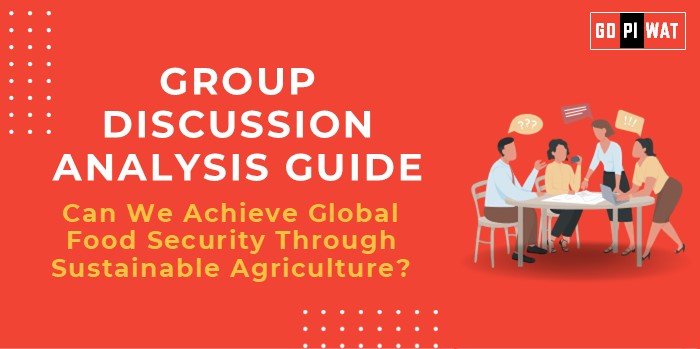🌍 Group Discussion (GD) Analysis Guide
📋 Topic: Can We Achieve Global Food Security Through Sustainable Agriculture?
🌟 Introduction to the Topic
- Opening Context: “With a projected global population of 9.7 billion by 2050, ensuring food security while maintaining ecological balance is a critical challenge. Sustainable agriculture offers a potential solution to feed the world without exhausting natural resources.”
- Topic Background: Food security entails consistent access to sufficient, safe, and nutritious food. However, conventional farming methods often deplete resources and contribute to climate change. Sustainable agriculture emphasizes practices that balance productivity with environmental conservation.
📊 Quick Facts and Key Statistics
- Global Hunger: 828 million people were undernourished in 2022 (FAO).
- Agriculture’s Environmental Impact: Contributes 24% of global greenhouse gas emissions (IPCC).
- Water Usage: Agriculture accounts for 70% of global freshwater withdrawals (World Bank).
- Sustainable Practices Uptake: Organic farming covers 74 million hectares worldwide (IFOAM).
- Food Waste: Nearly 1.3 billion tons of food is wasted annually, enough to feed 2 billion people (FAO).
🌍 Stakeholders and Their Roles
- Governments: Policy-making, subsidies for sustainable practices, research funding.
- Farmers: Implementation of eco-friendly methods such as crop rotation and precision farming.
- Private Sector: Investment in agri-tech and innovative farming techniques.
- Consumers: Adoption of sustainable consumption patterns.
- NGOs and International Organizations: Advocacy, education, and support programs for sustainable agriculture.
✔️ Achievements and Challenges
Achievements
- Yield Improvements: Sustainable intensification practices have improved yields by up to 79% in Africa (Nature).
- Carbon Sequestration: Agroforestry can capture 1.9 gigatons of CO₂ annually.
- Reduction in Resource Use: Drip irrigation reduces water usage by 30-70%.
- Global Adoption: Countries like Denmark have set goals for 100% organic agriculture by 2030.
Challenges
- High Costs: Organic inputs and infrastructure investments deter adoption.
- Limited Access to Technology: Smallholder farmers often lack resources for advanced tools.
- Policy Gaps: Inconsistent regulations across regions impede global scalability.
Global Comparisons
- Success: The Netherlands as a leading exporter of sustainable agricultural technology.
- Failures: Sub-Saharan Africa faces persistent food insecurity despite significant investment in sustainable methods.
Case Study:
India’s Zero Budget Natural Farming initiative has shown promising results in reducing input costs and improving soil health.
🗨️ Structured Arguments for Discussion
- Supporting Stance: “Sustainable agriculture aligns with SDG 2 (Zero Hunger) and SDG 13 (Climate Action), making it a viable pathway for achieving food security.”
- Opposing Stance: “High costs and technological barriers limit sustainable agriculture’s potential to achieve global food security.”
- Balanced Perspective: “While sustainable agriculture presents a promising approach, its success depends on bridging gaps in technology, policy, and investment.”
📚 Effective Discussion Approaches
- Opening Approaches:
- Data-Driven Start: “70% of freshwater withdrawals go to agriculture, yet millions remain food insecure.”
- Contrasting Examples: “The Netherlands’ success in sustainable farming contrasts sharply with Sub-Saharan Africa’s struggles.”
- Counter-Argument Handling:
- Highlight cost-sharing models in Denmark that make sustainability affordable.
- Propose policy-driven incentives to support smallholder farmers.
🔍 Strategic Analysis of Strengths and Weaknesses
- Strengths: Increased productivity, reduced environmental degradation, enhanced resilience to climate change.
- Weaknesses: High costs and initial investment, knowledge gaps among farmers.
- Opportunities: Technological innovations (e.g., AI in farming), policy-driven transformation (e.g., subsidies).
- Threats: Climate unpredictability, resistance to change among traditional farming communities.
🌟 Connecting with B-School Applications
- Real-World Applications: Agri-finance projects linking sustainable agriculture to profitability; operations case studies on supply chain optimization in organic farming.
- Sample Interview Questions:
- “How can technology drive sustainable agriculture?”
- “Discuss the role of consumer behavior in achieving food security.”
- Insights for B-School Students: Understand ESG (Environmental, Social, and Governance) criteria in agri-business; explore entrepreneurial opportunities in sustainable food systems.


